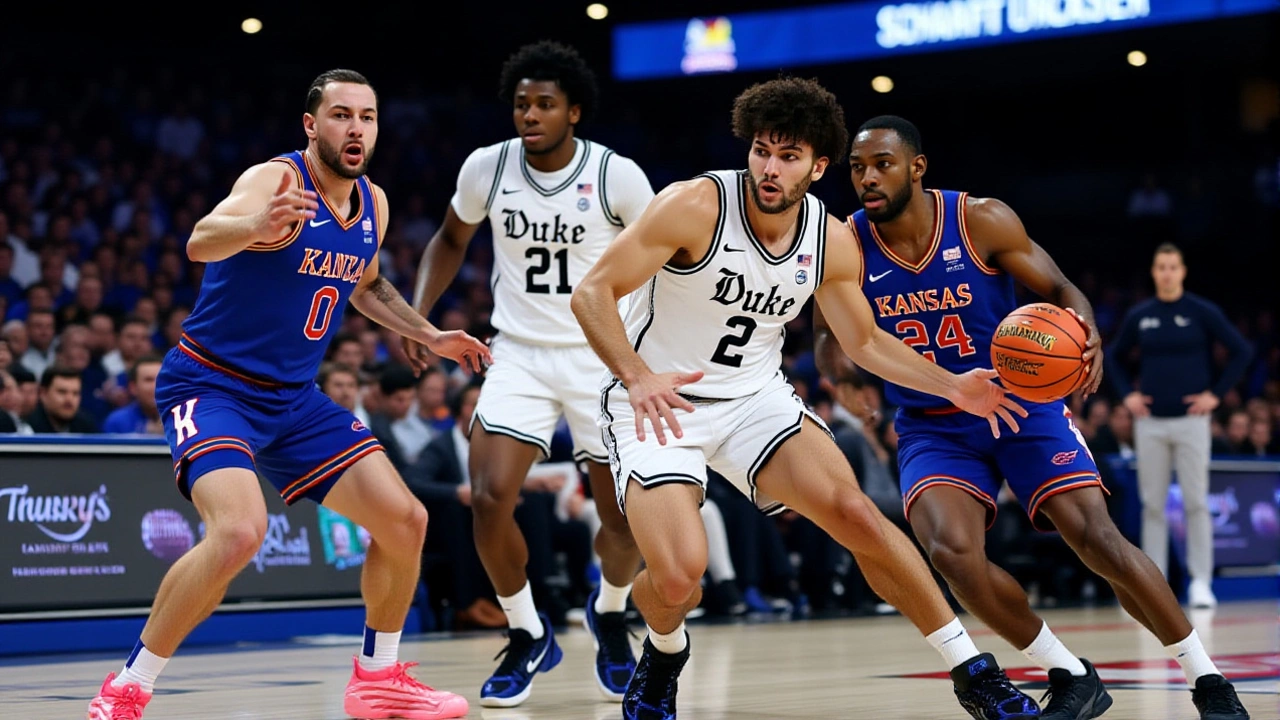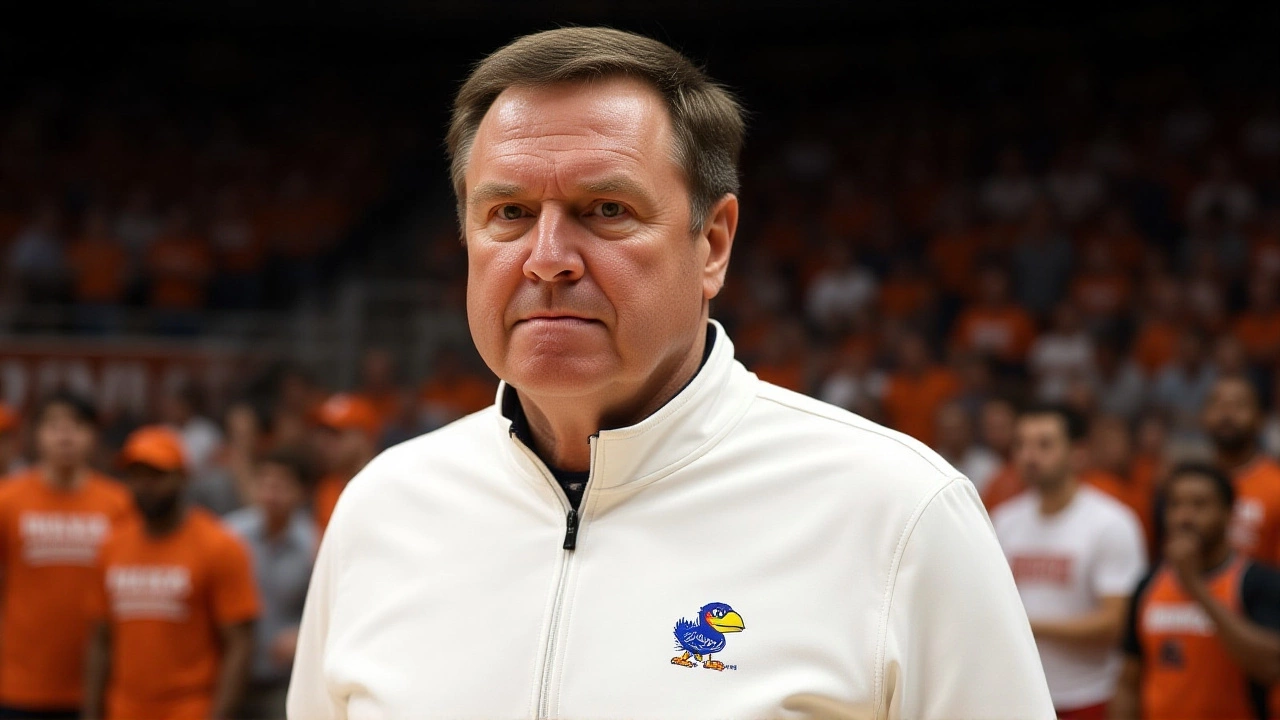On Tuesday, November 18, 2025, the Duke Blue Devils proved they belong among the nation’s elite, outlasting the Kansas Jayhawks 78-66 in a gritty, physical showdown at Madison Square Garden. The win, part of the State Farm Champions ClassicNew York City, wasn’t pretty—but it was telling. With Jon Scheyer in his third season as head coach, Duke showed the poise of a veteran team, even as they navigated the deafening noise and high stakes of one of college basketball’s most iconic arenas.
Defensive Grit Over Flashy Offense
Duke didn’t win with three-point barrages or dazzling drives. They won because they refused to give up second chances. The Blue Devils grabbed 34 defensive rebounds—11 more than Kansas—and turned those into fast-break points that swung momentum at critical junctures. Coach Scheyer made it clear after the game: “The key was, you know, our defensive rebounding.” That wasn’t just a platitude. It was the blueprint.
For all the hype around Kansas’s pressure defense, Duke absorbed it. They didn’t panic. They didn’t force bad shots. When the Jayhawks doubled down in the half-court, Duke’s guards found open men. Freshman Cayden Boozer finished with 16 points and three steals, while sophomore Patrick Ngongba added 12 points and eight rebounds, showing why he’s considered one of the most underrated defenders in the ACC.
Kansas Misses Peterson’s Playmaking
But here’s the twist: Kansas wasn’t at full strength. Head coach Bill Self had announced days before the game that starting point guard Darryn Peterson would be out “for the immediate future.” The absence wasn’t just a rotation tweak—it was a structural collapse. Peterson, who averaged 12.4 points and 6.1 assists last season, was Kansas’s primary playmaker and clutch scorer. Without him, the Jayhawks looked disjointed.
Guard Tre White, normally a secondary option, was forced into a primary role. He scored 18 points but shot 6-for-19 and committed five turnovers. Kansas’s offense stalled in the final eight minutes, going 2-for-12 from the field. “They did a great job protecting,” Self admitted post-game. “But we didn’t have the same rhythm. We missed Darryn’s vision.”
Preparation Through Pain
Scheyer didn’t downplay the challenge. He openly credited Duke’s early-season schedule for preparing them for this moment. “It’s the reason we played Tennessee in the exhibition game. You know, it’s the reason Texas that first game was very physical.” Those games weren’t just tune-ups—they were trauma drills. Duke faced physical, full-court pressure from Tennessee and Texas before ever stepping onto MSG’s hardwood. That experience paid off.
“We got some good stuff there,” Scheyer said, gesturing toward the raucous crowd. “But again, I think there’s more to be had. That’s the exciting part.” He wasn’t celebrating the win—he was evaluating the process. And that’s what separates this Duke team from last year’s. They’re not just winning. They’re learning.

Madison Square Garden: The Ultimate Test
Playing at Madison Square Garden isn’t just about the arena’s history. It’s about the weight of expectation. The noise. The cameras. The national spotlight. Scheyer noted, “This place is different, you know, playing MSG, it’s different.” His players didn’t flinch. Boozer, a freshman from North Carolina, hit a turnaround jumper with 2:14 left that put Duke up by 10—essentially sealing the game. Ngongba followed with a block on the next possession, sending the Duke bench into a frenzy.
According to NCAA.com, the 2025 Champions Classic “did not wow with tight games, but there were unmistakable messages sent.” Duke’s message? They’re back as a title contender. Kansas’s? They’re vulnerable without Peterson.
What’s Next?
Duke (4-0) heads into ACC play with momentum. Their next test: a home game against North Carolina on December 3. Meanwhile, Kansas (2-1) faces a tough road swing, including a matchup with Michigan State on November 27. The big question: will Peterson return before conference play? Self hasn’t given a timeline, but sources say he’s “making progress” in rehab.

Why This Matters
This wasn’t just a win for Duke. It was validation. Scheyer, who inherited a program built by Mike Krzyzewski, is no longer just the guy who took over. He’s the guy who’s building something new—something resilient. And Kansas? They’re a top-25 team with a glaring hole. The Jayhawks still have talent. But without Peterson, they’re playing with one hand tied behind their back.
The Champions Classic didn’t deliver a buzzer-beater. But it delivered clarity. Duke is ready. Kansas? They’re still searching.
Frequently Asked Questions
How did Duke manage to win without a dominant scoring performance?
Duke won through defense and rebounding, not scoring volume. They held Kansas to 38% shooting and grabbed 34 defensive rebounds—11 more than the Jayhawks. That allowed Duke to control tempo and limit second-chance points. Their bench outscored Kansas’s 24-8, and five players scored in double figures, spreading the load evenly.
Why is Darryn Peterson’s absence so impactful for Kansas?
Peterson was Kansas’s primary ball-handler and clutch playmaker, averaging 6.1 assists and 12.4 points last season. His absence forced Tre White into a larger role, which disrupted the offense’s rhythm. Kansas’s assist-to-turnover ratio dropped from 1.8:1 to 1.1:1 in this game, a clear sign of their offensive disarray without him.
How does this win affect Duke’s NCAA Tournament chances?
This win strengthens Duke’s resume significantly. Beating a top-25 team on the road, especially in a marquee event like the Champions Classic, adds a quality win to their profile. With wins over Texas and Tennessee already on their résumé, Duke now has three wins against teams projected in the NCAA Tournament field—key for at-large selection committees.
Is Jon Scheyer proving he can lead Duke without Coach K’s shadow?
Absolutely. Scheyer isn’t trying to be Krzyzewski—he’s building his own identity. His emphasis on physicality, defensive discipline, and player development is working. He’s turned Duke into a team that wins ugly games, something Coach K rarely had to do. The poise under pressure at MSG suggests Duke is no longer in transition—they’re in control.
What’s the timeline for Darryn Peterson’s return?
Kansas has not provided a specific return date. Coach Self said Peterson is out “for the immediate future,” which typically means at least 3-4 weeks. Given the schedule, he’s unlikely to return before the December 3 game against Michigan State. His absence could force Kansas to rely more on freshman guard K.J. Allen, who has shown flashes but lacks experience.
How does this game compare to past Champions Classic matchups?
Unlike recent editions that featured buzzer-beaters or overtime thrillers, this game was a grind—a true test of toughness. The 12-point margin was the largest in the last five Champions Classic games between Duke and Kansas. It harkens back to the 2010 matchup, where defense and rebounding decided the outcome. This one felt more like a classic battle than a highlight reel.
